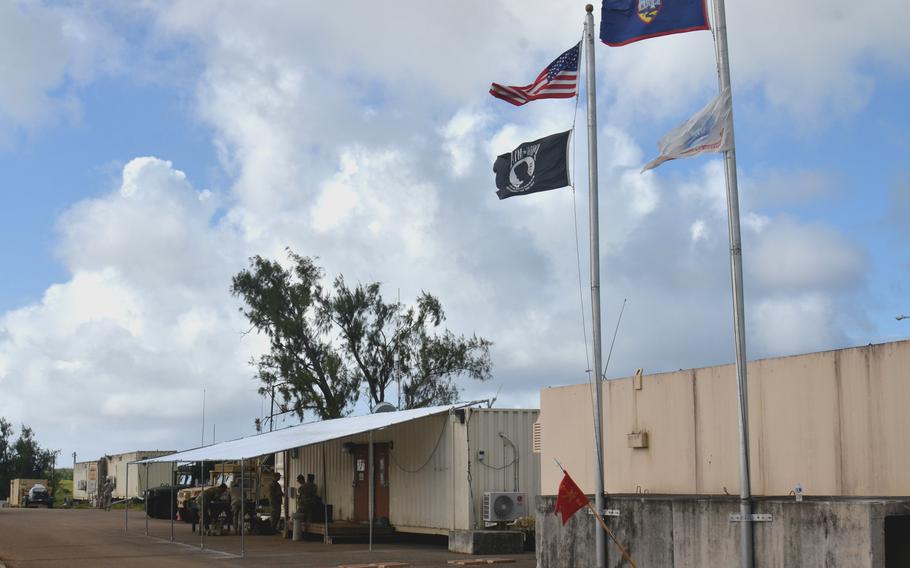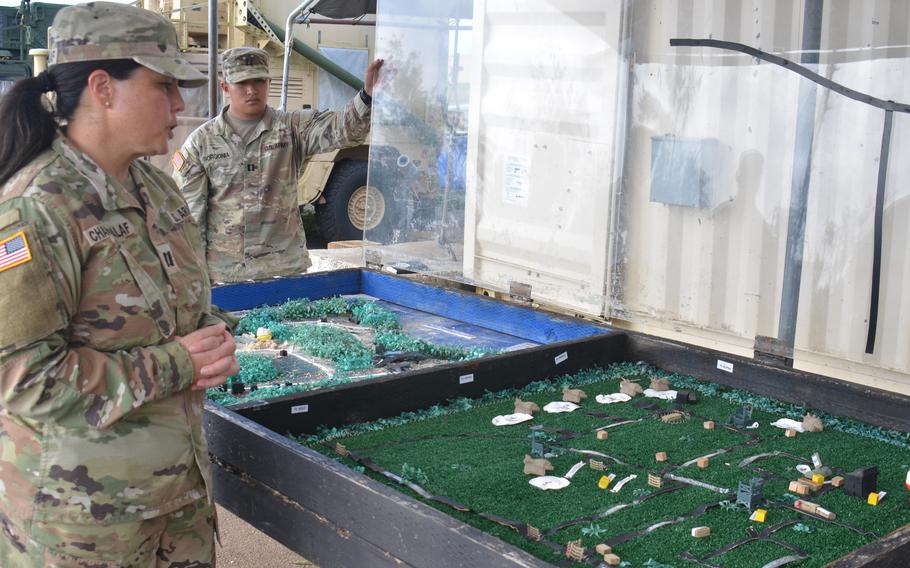
Task Force Talon operates out of austere offices at Site Excalibur, Guam, Nov. 30, 2023. (Seth Robson/Stars and Stripes)
SITE EXCALIBUR, Guam — A former military housing area near the Marine Corps’ newest base is the most developed of numerous missile-defense facilities in the works to protect America’s westernmost Pacific territory.
The South Finegayan neighborhood, just south of Camp Blaz, has been home to Task Force Talon since September. The unit is part of the Army’s 38th Air Defense Artillery Brigade, headquartered at Sagamihara, Japan.
The battalion-sized unit is made up of 200 soldiers on Guam and 100 operating Japan-based radars. The task force has deployed six Terminal High Altitude Area Defense, or THAAD, launchers, a radar, command and communications gear and dozens of armored vehicles along suburban streets where a few vacant houses still stand amid overgrown fields.
The spot, renamed Site Excalibur, resembles the sort of austere base U.S. troops might occupy in a combat zone, but it is “by far the most developed site” of numerous missile-defense facilities planned for Guam, Task Force Talon commander Col. Jonathan Stafford told Stars and Stripes at the site Nov. 30.
Responding to threats
The effort to build a 360-degree missile-defense system on Guam is a response to perceived threats from potential adversaries like China and North Korea, including ballistic, cruise and hypersonic missiles.
The system is expected to be operational by 2027 and comprise up to 20 sites across the island, according to the Missile Defense Agency.
Locations for the Enhanced Integrated Air and Missile Defense System range from Guam’s northernmost coastline to the island’s relatively remote southern region, according to a fact sheet released by the agency in May.
The system’s components — radars, sensors, launchers, interceptors, support facilities and a command-and-control center — would be spread around the island to achieve its 360-degree capability, according to Joint Region Marianas, the installation management command on Guam.

Task Force Talon members Capt. Denise Chargualaf, left, and Capt. Thomas Borgonia show a model of Site Excalibur, Guam, at the facility on Nov. 30. (Seth Robson/Stars and Stripes)
Long-term location
At Site Excalibur, soldiers work inside battered shipping containers.
“The housing area was closed years ago and left abandoned,” Stafford said. “We have a number of milcon (military construction) projects being designed to be built here in the coming years. This is going to be the (task force’s) long-term location.”
A motor pool and a headquarters building are the most needed facilities, said Capt. Riley Campbell, commander of Echo Battery, 3rd Air Defense Artillery Regiment, which operates the THAAD launchers on Guam.
“Our motor pool is just a tarp,” she said at the site, gesturing to a vehicle parked under a fabric rain shelter.
A decade ago, the island’s missile defense was provided by warships equipped with the Aegis weapon system. THAAD was deployed to Guam in 2013 in response to North Korean ballistic missile tests directed at the island, Stafford said.
“At that time, we had just fielded THAAD,” he said of the system that uses kinetic energy to destroy an enemy missile far above the ground.
Last year, a THAAD system operated by the United Arab Emirates made its first real-world intercept against an incoming Houthi ballistic missile.
Task Force Talon initially operated from Andersen Air Force Base, east of Blaz. The move to Site Excalibur means soldiers have a lot more space for the missile-defense equipment, Stafford said.
“At our old site, we weren’t able to deploy all our launchers,” he said. “Here, we can finally deploy all six.”
The move means there are fewer issues deconflicting the launchers from aircraft, Stafford said.

Task Force Talon members, from left, Master Sgt. Ayinde Waverly, Master Sgt. Steven Smith and Capt. Riley Campbell and unit commander Lt. Col. Jonathan Stafford stand near a Terminal High Altitude Area Defense, or THAAD, launcher at Site Excalibur, Guam, on Nov. 30. (Seth Robson/Stars and Stripes)
Familiar turf
Typhoon Mawar, which struck Guam in May, complicated the soldiers’ move, Stafford said, noting that troops displaced from their homes by the storm continued the missile-defense mission.
Most Task Force Talon soldiers come to Guam on two- to three-year tours. Their security is provided by Guam National Guard troops, he said.
“Being from Guam, we know about the local areas,” Capt. Denise Chargualaf, who leads the security force at Site Excalibur, said during Stars and Stripes’ visit.
“When I was a teenager, I used to play here with friends,” she said of the housing area.
Another guard soldier securing the site, Staff Sgt. Lynn Rengulbai, said she lived there with her family from 1985 to 1989.
The daughter of an Air Force bomb loader, Rengulbai was guarding a checkpoint yards from where her old home stood.
“Back then there were a lot of military on Guam,” she recalled.
Spc. Christopher Timoteo, another Guam guard member at the site, also has happy memories of playing there with friends and family as a youngster.
“Being from the island, it’s cool how we can visit this site and see how much it has changed,” he said.